News from Maison de la Gare
Senegalese Volunteers Take Action for the Talibé Children
Tweeter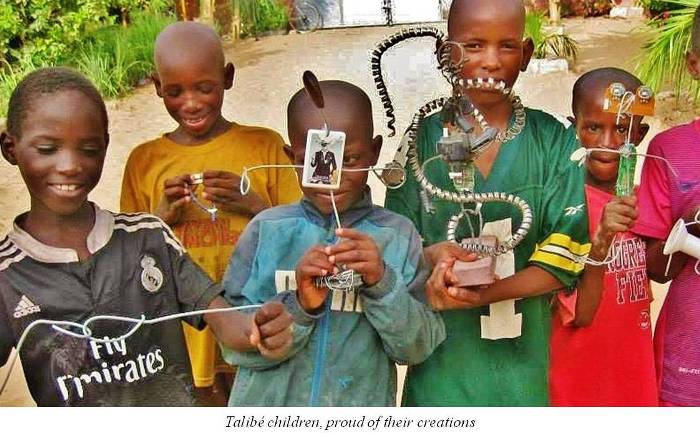
Thanks to Rose Mbaye, Eyram Adedze, Ben Ouattara, Mame Coumba and "Davis Projects for Peace", Senegalese university students have joined the struggle for justice
This project came to pass thanks to
the initiative of four African students from the University of Rochester in New York
and a grant that they received from
Davis Projects for Peace. The project made it
possible for close 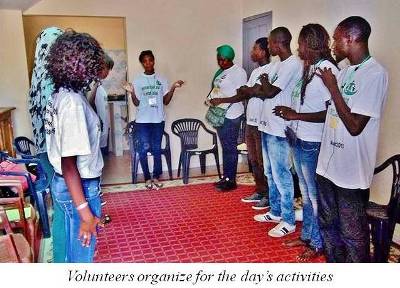 to fifty Senegalese volunteers to address a problem close to their
hearts, a problem they thought they could eliminate or reduce. Many of these
volunteers, however, were only beginning to learn what exploitation truly is.
to fifty Senegalese volunteers to address a problem close to their
hearts, a problem they thought they could eliminate or reduce. Many of these
volunteers, however, were only beginning to learn what exploitation truly is.
The volunteers were mainly students from Gaston Berger University in Saint
Louis and Alioune Diop University in Bambey. They gave up their summer vacations
to help Maison de la Gare in its efforts for the talibé children, and to learn more
about how organizations committed to child protection act on behalf of the victims
of abuse. The project was actively supported by the Ministry of Justice through
its office for social action in open environments (AEMO),
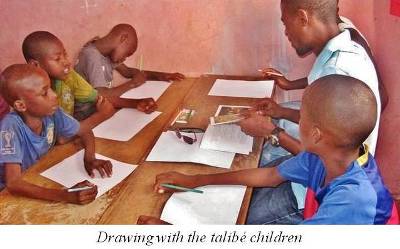 along with the Prefect,
the Governor and the General Secretary of Maîtres Coraniques du Sénégal (Quranic
Teachers of Senegal).
along with the Prefect,
the Governor and the General Secretary of Maîtres Coraniques du Sénégal (Quranic
Teachers of Senegal).
The university volunteers divided into groups for the activities in Maison de la
Gare’s welcome centre, to allow everyone to be fully involved and to energize the
activities with friendly competition between the groups. The talibé children felt
the warm embrace of these university students and were open to discussing with them
while cooperating fully with their instructions for the various activities. The
students animated creative activities such as coloring, making collages, playing
checkers 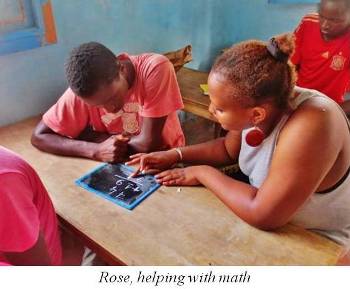 and making masterpieces out of recycled materials. And they taught
French and basic math classes. They reinforced for Maison de la Gare that it’s
not necessary to wait for help from the outside in order to take action on behalf
of the talibé children.
and making masterpieces out of recycled materials. And they taught
French and basic math classes. They reinforced for Maison de la Gare that it’s
not necessary to wait for help from the outside in order to take action on behalf
of the talibé children.
Maison de la Gare has always worked to provide the talibé children with
possibilities for developing their personal potential. In addition to education,
gardening, football and karate, there is one activity that the children have
embraced to show their awareness of the challenges of society and their ability
to contribute.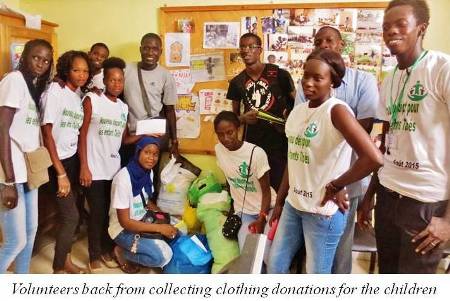 Working with the volunteers, many of the children focused on creating their own
small cars. Others, more daring, made masks with used oil tins, drink cans and
empty deodorant bottles. There is a promising future ahead for many of these
young people. About fifty young talibé children showed us what they were
capable of, through objects, colors, shapes and even morphology. They
bequeathed their personalities to these works, marking them uniquely with a
symbol which was their true name.
Working with the volunteers, many of the children focused on creating their own
small cars. Others, more daring, made masks with used oil tins, drink cans and
empty deodorant bottles. There is a promising future ahead for many of these
young people. About fifty young talibé children showed us what they were
capable of, through objects, colors, shapes and even morphology. They
bequeathed their personalities to these works, marking them uniquely with a
symbol which was their true name.
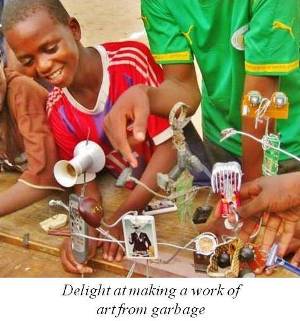
In another initiative, groups of ten volunteers went into the streets of Saint
Louis to collect money and clothing for the children. The idea was to ask for
donations of clothing for the talibé children from homes and stores, but many
people preferred instead to donate money and other things. At the end of the
project, the clothing collected was distributed to the talibé children, and
the money was used to contribute to the cost of
renovations carried out in a number of daaras.
Mapaté summarizes the project in this way: “For us, this project was a
great success. The objectives that had been set both by the volunteers and
by Maison de la Gare 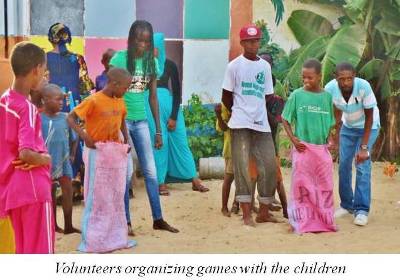 were achieved. For Maison de la Gare, the project
supported us enormously in our daily efforts to come to the aid of the
talibé children. We were able to revisit many daaras and to improve
conditions there. Also, the volunteers carried the message about the
situation of the talibé children to many people in the local community, with
the collaboration of families linked to the daaras and of the marabouts
themselves. And in terms of education, the university student volunteers
reinforced the children’s abilities in French, in math and in creative art.”
were achieved. For Maison de la Gare, the project
supported us enormously in our daily efforts to come to the aid of the
talibé children. We were able to revisit many daaras and to improve
conditions there. Also, the volunteers carried the message about the
situation of the talibé children to many people in the local community, with
the collaboration of families linked to the daaras and of the marabouts
themselves. And in terms of education, the university student volunteers
reinforced the children’s abilities in French, in math and in creative art.”
Above all,  this project made it possible for the Senegalese university
students to be volunteers in their own country. Even though much
infrastructure is lacking, this very visible initiative gave local
organizations an understanding of the collaborative efforts that Maison de
la Gare has set in motion. And we were able to see how Senegalese
volunteers can contribute to improving the lives of the talibés children,
in parallel with the invaluable contributions made over many years by
volunteers from the developed world.
this project made it possible for the Senegalese university
students to be volunteers in their own country. Even though much
infrastructure is lacking, this very visible initiative gave local
organizations an understanding of the collaborative efforts that Maison de
la Gare has set in motion. And we were able to see how Senegalese
volunteers can contribute to improving the lives of the talibés children,
in parallel with the invaluable contributions made over many years by
volunteers from the developed world.






















